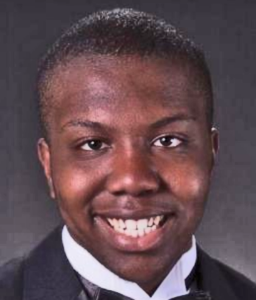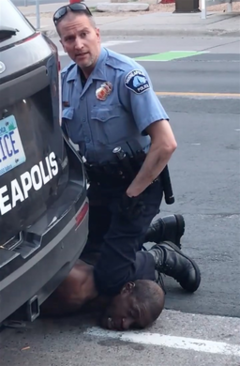Guest column by Naka Elelleh: When we all decide what is right, we can influence the world around us
Being Black in America means getting desensitized to a lot of things.
![]()
By Naka Elelleh

Naka Elelleh

Frame from witness video, showing Derek Chauvin kneeling on George Floyd’s neck
Photo courtesy Wikipedia
When I first watched the video of George Floyd dying as his neck was being pressed down by Minneapolis Police Officer Derek Chauvin for nearly nine minutes, I felt an unquenchable rage. I wanted justice.
Ever since I was in middle school, I have been watching in the media Black people die at the hands of the police. The emotion I feel is a song played many times over: one of subdued anger and eventual sadness when I realize the officer would likely just be set free. This left me like a beach in an emotional typhoon, unable to withstand my grief, and having my faith in the justice system slowly erode away.
With the criminal death of George Floyd, I felt different. The anger I felt watching the evidence in news stories and press conferences was gripping — as it was to many other Americans. For the first time in my adult life, I felt the revolution was truly televised.
How this came to a head were the protests of May 25, 2020. When the world was surrounded by the fear around COVID-19, I’m proud to say that Gilroy took action and did what others did many years ago: mobilize. We went out and protested. Even though I was not a Gilroy resident at the time, Garlic City contributed to my image of America opening its eyes.
 When Chauvin and his colleagues were found guilty, I felt I could finally let go of a deep breath that I didn’t know I was even holding for several months. Floyd’s murder was a tragedy. It should never have happened but it was inevitable. When the system is never held accountable at all, the police tend to push their power to an extent they think they can get away with anything.
When Chauvin and his colleagues were found guilty, I felt I could finally let go of a deep breath that I didn’t know I was even holding for several months. Floyd’s murder was a tragedy. It should never have happened but it was inevitable. When the system is never held accountable at all, the police tend to push their power to an extent they think they can get away with anything.
Decades have shown that some police officers have little scrutiny when it comes to the lives of people they are supposed to protect. And when it comes down to it, the justice system usually goes with the police officer. With Chauvin’s verdict, Americans saw police officers can be held accountable for their actions. But it’s really a cold comfort knowing the next George Floyd is around the corner and we’re not really doing anything to stop his death.
 Being Black in America means getting desensitized to a lot of things. The never-ending waves of news stories of victims makes you feel like you’re drowning. Hearing about the injustice day after day just starts to wash over you.
Being Black in America means getting desensitized to a lot of things. The never-ending waves of news stories of victims makes you feel like you’re drowning. Hearing about the injustice day after day just starts to wash over you.
The issues from Dr. Martin Luther King Jr.’s time have not fully eluded us, even here in the South Valley. From the recent discussions in the Gilroy community about the raising of the pride flag at City Hall, to the lack of inclusivity in the art on the 150th anniversary time capsule, to our recent discourse about the raised mission bell in downtown Gilroy, it is clear King’s prediction about the future of America is coming true. That doesn’t mean it is the new normal. Just like with the Floyd protests opening my eyes, through public unity we can show that humanity matters and that history matters.
The essence of Martin Luther King Jr. Day is public unity. The systems that hold us down and that held George Floyd’s neck to the pavement are the same. When Dr. King said that “Justice too long delayed is justice denied,” he wasn’t talking about one race or one religion. True justice is shown through collaboration. When we all decide what is right, we can influence the world we live in. History is always being made — and the world that King strived for is well within our grasp.
Nineteen-year-old Naka Elelleh is a Gavilan College student graduating in May. He can be reached at [email protected].
- Guest column by Tim Davis: Two Gilroy nonprofits join forces to help those in need - April 17, 2024
- Your Retirement … with Marisa Otto: Do you know how your retirement income is getting taxed? - April 17, 2024
- Guest column by Jaci Muro: Gilroy Foundation supports young people with college scholarships - March 30, 2024
